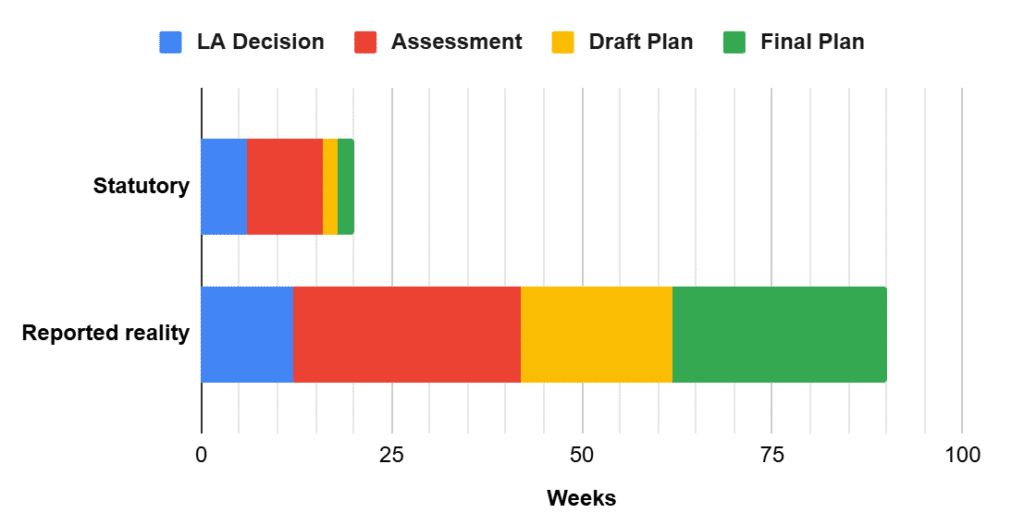We at Sunbeam Education know that England’s SEND system is struggling to keep up with demand: 576,474 children had an Education, Health & Care Plan (EHCP) as of 2024. And getting one isn't easy. Barely half (50.3%) of EHCPs were issued within the 20-week limit in 2023. The Government Ombudsman has logged EHCP delays of up to 90 weeks.
Navigating this process is very challenging, and the wait can be stressful. Here’s how you can stay on top of the process and keep things moving.

This timeline puts those figures in context: the top bar shows what should happen; the lower bar shows the reported reality in some cases, taking 90 weeks (nearly 2 years).
1) Build an Evidence Log
Use our free template to timestamp every email, phone call, report, and meeting. This log is critical if you need to escalate or appeal.
Download our EHCP Evidence Template
2) Use a Calendar For Every Deadline
Don't let deadlines get away from you. Use this table and set calendar reminders.

3) Use Our 'Chasing Up' Letter Templates
These templates give formal notice to the Local Authority (LA) and let them know if a deadline has been overrun.
Template A – Polite Chase (after 6 weeks)
Subject: Child’s EHCP Assessment Decision Outstanding – [Child’s Name, DOB]
Dear [EHCP Case Officer],
Six weeks have passed since my request for an EHC needs assessment on [date]. Please confirm whether the local authority will proceed, in line with Regulation 5(1) of The Special Educational Needs and Disability Regulations 2014.
Thank you for your attention.
Yours sincerely,
[Parent Name]
Template B – Formal Complaint & ‘Letter Before Action’ (after 20 weeks)
Subject: Failure to Issue EHCP within Statutory Timescale – FORMAL COMPLAINT
Dear [Head of SEN/Monitoring Officer],
It has now been [X] weeks since my request (statutory maximum: 20). This delay breaches s.36(11) Children & Families Act 2014 and reg. 13 SEN Regs 2014.
Unless a final EHCP is issued within 10 working days, I will:
- Refer the matter to the Local Government Ombudsman.
- Seek judicial review for failure to discharge a statutory duty.
Please treat this as a ‘Letter Before Action’ under the Pre-Action Protocol for Judicial Review.
Yours sincerely,
[Parent Name]
4) Prioritise Independent Evidence
Try not to wait for the LA assessments. If you can get an independent educational psychologist or occupational therapy assessment, their reports can be inserted as late evidence and carry extra weight in a tribunal.
5) Collect Health and Social Care Information
As well as educational reports, make sure you document health and social care needs. Gather reports from doctors, therapists (like SALT or physio if needed), or social workers. This information is important for Sections C, D, G, and H of the EHCP and gives a complete view of what your child needs.
6) Keep in Contact with the School SENCO
Ask for support meetings every half-term, recording agreed adjustments. While waiting for an EHCP decision, schools must use their 'best endeavours' under the SEND Code of Practice (Chapter 6) to meet your child's needs through the graduated approach (Assess, Plan, Do, Review). This doesn’t mean that they have to do everything that you ask; they are constrained by their resources, such as teacher time and budget. This SEN Support can involve strategies (like visual timetables or movement breaks), specific help (small group work), reasonable adjustments (different ways to provide feedback), or accessing additional advice, LA or external coaching or tutoring, even before an EHCP is complete.
7) Prepare for Mediation or Tribunal
If you disagree with the Local Authority's final decision about the EHCP, or they fail to issue one, there are ways to challenge it. The first step usually involves mediation; an independent mediator facilitates discussion between you and the LA to help you reach an agreement. If mediation doesn't work, or you choose not to mediate, you can appeal to the specialist SEND Tribunal.
The SEND Tribunal (SENDIST, which stands for Special Educational Needs and Disability Tribunal) is an independent body that listens to appeals against LA decisions. Success often hinges on having well-organised evidence (see our evidence template) and meeting the legal deadlines.
8) Where to Find Help
Your local SENDIASS (Special Educational Needs and Disabilities Information Advice and Support Service) offer some free advice. We also provide online resources, and feel free to contact us if you have any questions.
Quick SEND Myths Busted
- "You need a diagnosis first." Not true. A child does not need a formal diagnosis to receive SEN support or qualify for an EHC needs assessment. LA's focus is on the students' needs and the barriers they face.
- "The school must spend £6,000 first." Not true. There is no legal requirement for a school to prove they have spent a specific amount from their budget before an EHC needs assessment can be made. The threshold is whether the child may have an SEN requiring provision via an EHCP.
- "You must use the LA's online form to apply." Not true. LAs often have online portals or specific forms; you can request an EHC needs assessment via a letter or email.





